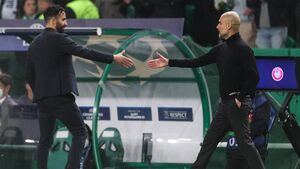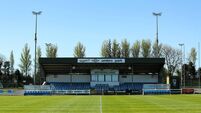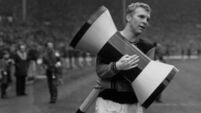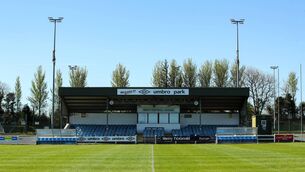Troubled times on two sides of Manchester

Ruben Amorim, now Manchester United manager, greets Manchester City boss Pep Guardiola during his time in charge of Sporting Lisbon who beat City 4-1 in last month's UEFA Champions League match at the Jose Alvalade stadium in Lisbon. Picture: Carlos Costa/AFP via Getty Images
In the city of Manchester this week, there are two managers at different stages of their careers but both facing enormously difficult challenges. It’s hard to know who is feeling worse between Ruben Amorim and his counterpart on the blue side of the city, Pep Guardiola.
Just last month, Amorim helped heap a dollop of misery on City in the final days of his stint as Sporting boss, when his team hammered the Premier League champions 4-1 in a Champions League clash in Lisbon. Since that reversal on November 5, City are now on a run of just one win in nine matches. It’s a staggering collapse in form for a side that has collected the last four Premier League titles in a row and looked destined to make further inroads again this season with some of their rivals appearing to be in transition.
City’s woeful form can be attributed, in part, to shocking luck on the injury front; for Saturday’s 2-2 draw with Crystal Palace at Selhurst Park, Guardiola was forced to name five Academy players on the bench due to the absence of several first team players, including John Stones, Phil Foden, Nakan Ake and Mateo Kovacic to name but a few. Rodri, the Ballon d’Or winner, is a long-term absentee with an ACL injury, arguably the biggest dent in City’s title aspirations.
Even allowing for all of their injury troubles, the fall-off in City’s form has been remarkable. What is going on?
Is the absence of Rodri that big an issue in the middle of the park that the entire team looks vulnerable? It has to be more than that. It wouldn't be an outrageous statement to say that fatigue of a mental sort may have set in at the Etihad, after so many years of success. Pep signed a new contract recently, which was something of a surprise, but even the best managers grow stale eventually. It happened for Pep previously at Barcelona, where he cited tiredness as his main motivation for his departure in 2012.
Eight points behind Liverpool at this stage, with the Reds also holding the ace of a game in hand, City’s route to the summit is as steep as it has ever been. If Pep wins the title from here, it’ll be one of his greatest managerial achievements.
If you thought things were bad for City, though, the problems are much more fundamental at Manchester United.
The scale of Ruben Amorim’s challenge was illustrated neatly in Saturday’s 3-2 defeat to a Nottingham Forest side that has made a very good start to the season, but went into the game at Old Trafford off a run of three defeats in four. The win was their first at Old Trafford in 30 years.
Amorim arrives in England with a huge opportunity to advance his own personal CV.
Given Manchester United’s struggles under Erik ten Hag, the expectation for this squad is at an all-time low. Mired in the bottom half of the table, the only way, it would appear, is up.
The 4-0 win over Everton – with Marcus Rashford scoring twice – led to some ‘United are back’ posts on social media, yet those filled with some optimism were brought back down to earth with the weekend result.
All things considered, though, it has been a reasonable start for Amorim and there were signs in the 2-0 defeat to Arsenal of a better structure in the team. Similarly, there was a discernible change in style against Ipswich Town in his first game in charge with an aggressive pressing style evident at various stages in the game.
However, one wonders whether such a system is suited to a midfield which includes both Casemiro and Christian Eriksen on occasion, both of whom don’t have the legs to get around the park and apply pressure on the ball as the manager would like.
In this column earlier this year, in the final days of the ten Hag reign, we spoke about the nature of the rebuild required at Manchester United. Clearly, since the Ferguson era, the way the club has been run has helped precipitate a downward spiral in performances, along with managerial mistakes and underperforming players. Recruitment has been poor, with bloated fees being paid for players that simply haven’t delivered, while extortionate contracts have been handed out. Put simply, the United squad is one that looks low on motivation and has done for quite a while.
For all that, of more concern to United fans should be the news that emerged quietly on Sunday morning.
Dan Ashworth is one of the most sought after names in English football administration, having been credited with helping spark an upturn in the performances of England national teams following his appointment as the English FA’s Director of Elite Development in 2012. England now have one of the best production lines in the world, as performances at under-21 and senior level indicate.
Ashworth was the subject of a lengthy and acrimonious dispute between Newcastle, where he was Sporting Director, and Manchester United before he eventually moved to Old Trafford to take up his position there as Sporting Director in July of this year. With Jim Ratcliffe and INEOS coming on board as one of the major shareholders, it felt as though United may have started to get their act together.
Alas, Ashworth has now left his position at Manchester United, with a statement on Sunday saying he departed by mutual agreement.
To lose someone of Ashworth’s calibre, after such a prolonged effort to get him in the first place, points to a continuing dysfunction behind the scenes despite changes at ownership level.
Until the background noise is silenced, you can’t expect United to make too much noise on the field, regardless of who is in the dugout.





